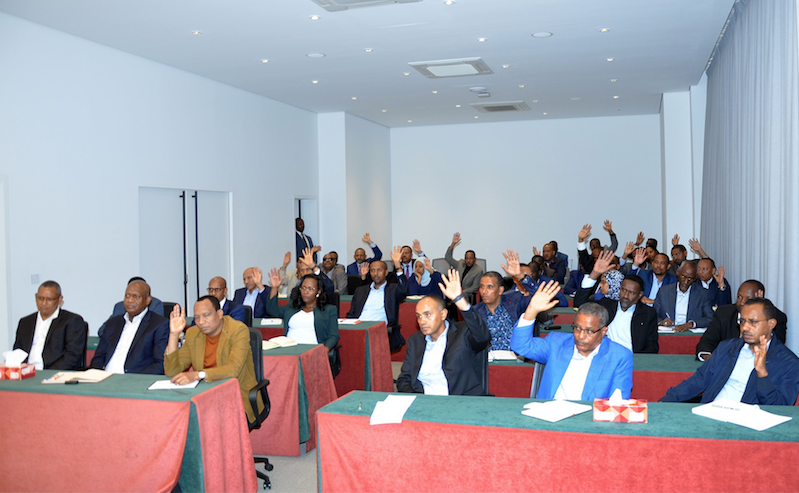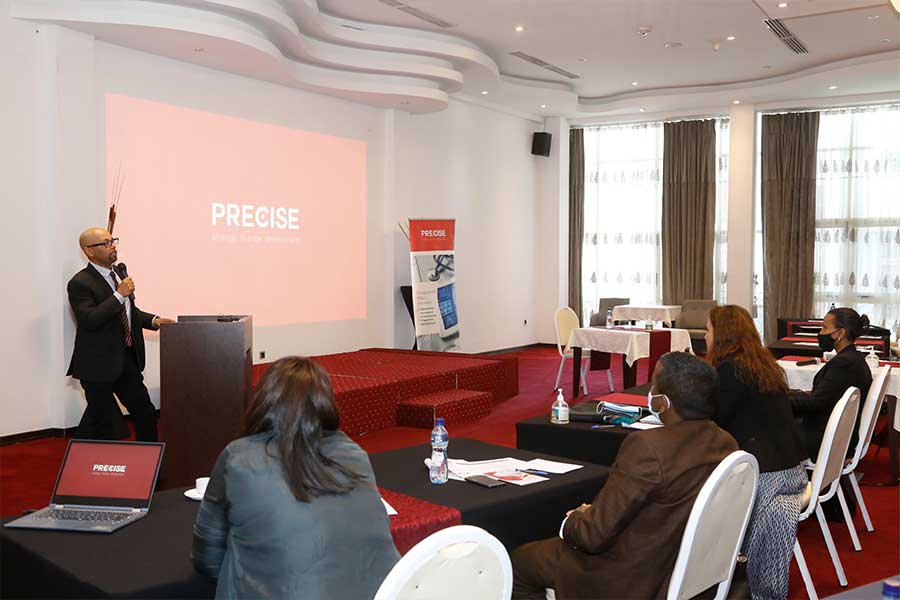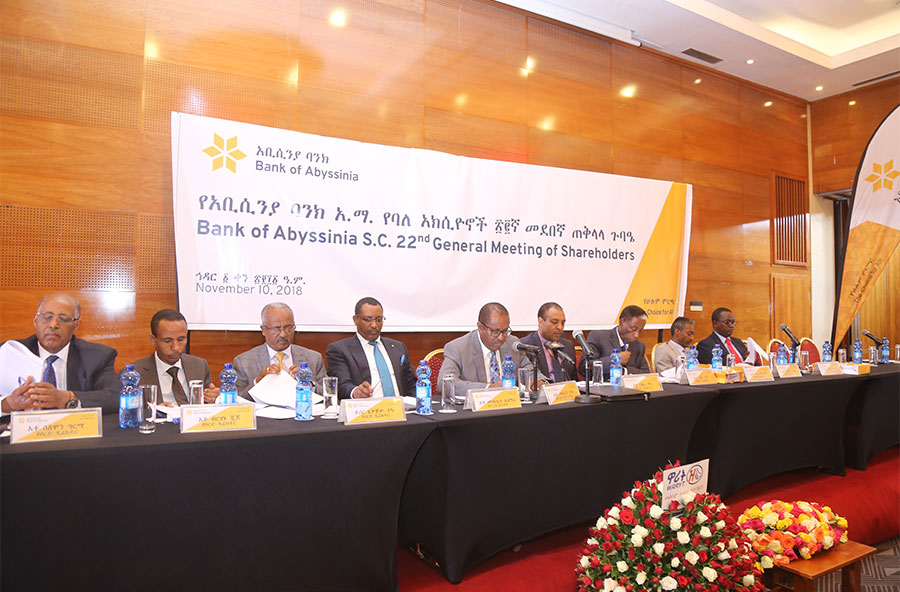
Fortune News | Aug 20,2022
A high-level committee chaired by Prime Minister Abiy Ahmed (PhD) has come online with the main aim of creating more jobs in the industry sector.
The National Investment & Job Creation Steering Committee, which has the Prime Minister, Deputy Prime Minister, ministers, presidents of regional states and city administrations, and heads of two federal agencies as members, was officially launched on August 7, 2019. It aims to draw foreign direct investment and create three million jobs.
Having 27 members, the committee targets to create 1.1 million of the jobs in the industrial sector, one million in the agricultural sector and the remaining 950,000 in the service sector.
Deputy Prime Minister Demeke Mekonnen, Teklewold Atnafu and Dessie Dalke, advisors at the Prime Minister's Office, are also among the members of the committee. Ministers of Mines & Petroleum; Trade & Industry; Peace; Agriculture; Culture & Tourism; Labor & Social Affairs and Innovation & Technology are also the members ofthe committee.Commissioners of the Ethiopian Investment Commission and Job Creation Commission are coordinators of the Committee.
Focusing on creating ''sustainable and decent jobs,'' the Committee will be meeting every two months for updates while all of the member institutions will be sending reports to the two coordinators monthly.
The committee arrived on the scene as an add-on to the National Ease of Doing Business Steering Committee, which was formed six months ago with the main aim of relaxing the business climate in the country. The committee introduced reforms from relaxing the tax administration to the business license registration systems.
The outcomes of the reforms made the government upgrade its focus to employment and investment, according to Prime Minister Abiy.
Under the main committee, there are three sub-committees: Doing Business Reform, chaired by Fetleworq G. Egziabher, the minister of Trade & Industry; Job Creation that will be chaired by Deputy Prime Minister Demeke; and a Sub-committee for investment areas that requires special attention.
The third sub-committee, which is chaired by Umer Hussien, minister of Agriculture, has four areas under it including agriculture, mining, tourism and technology.
"Even though we have all the resources like labour and land," said Prime Minister Abiy, "we weren't able to attract sufficient amounts of investment."
This time the government aims at attracting foreign investment companies that come to the country with fresh capital and create sustainable jobs, according to Abiy.
Out of the three million jobs, irrigation and horticulture are expected to create the highest number of jobs, accounting for half a million. Construction and manufacturing follow with 311,651 and 302,269 jobs, respectively.
Divided by regional states, the largest tally of jobs are planned to be created in Oromia Regional State, accounting for 1.1 million jobs, while 700,000 and 600,000 jobs are expected to be created in Amhara and Southern Nations, Nationalities & Peoples’ regional states, respectively. The government also aims at creating a quarter of a million jobs in the capital.
Alemayehu Geda (Prof.), a macroeconomist and lecturer at Addis Abeba University who conducted an assessment on general employment last year, views the plan as very specific and detailed. He also appreciates it for creating jobs that will have a great impact on the economy, including lifting the people from poverty.
"But it has fundamental problems when it comes to the feasibility of the plan," said Alemayehu, who is concerned with the source of the financing for the execution of the plan.
Looking at the inflexibility of the economy and checking the labour market profile, bringing a radical and diversified change to make the industrial sector the highest employer is very difficult, according to Alemayehu, who says that more jobs are created in the small and micro business level.
The expert says that small businesses like motorcycle services and garages in the service sector are the highest employers.
Currently, agriculture creates employment for 68pc of the population, while services and industry create jobs for 22pc and nine percent of the working population, respectively. Out of 100 people, 17.8 of them are jobless.
"So how come a fundamental change would arrive without investing in the industry sector?" Alemayehu questions.
On a yearly base, two to three million youth join the workforce, and 53pc of the total population is between the age of 15 and 64.
The Committee expects 15pc of the jobs will be created during the first and second quarters of the fiscal year each while the second and third quarters will see 35pc of the jobs to be created.
Between 2016 and 2019, a total of 5.7 million jobs were created, depicting an average of 1.4 million jobs a year.
To improve the investment climate, there are a couple of issues that need to be addressed, according to Abebe Abebayehu, commissioner of the Ethiopian Investment Commission.
"Problems at the workplace, issues with security and instability, low perceptions on the benefits of an investment, poor post-investment support, as well as the forex crunch and poor infrastructure development should be addressed," Abebe said.
By 2017 the government aims to create 14 million jobs and 20 million by 2022, according to Ephrem Tekle, commissioner of the Job Creation Commission.
"As a country, the biggest challenge is this," said Ephrem.
Even if the plan becomes successful, it will disrupt the larger economy by creating inflationary pressure, according to Alemayehu, who says that all the three million employed people would invest 80pc-90pc of their income on food items.
"There is no domestic agricultural production that can meet their demand," Alemayehu told Fortune. "Thus, the country has to import basic commodities, at least for one or two years just to stop the growth of the inflation rate."
Annually, the country is spending 1.4 billion dollars to import basic commodities.
Alemayehu also recommends the government give special attention to ensuring political stability, which is a significant factor in foreign direct investment flow.
PUBLISHED ON
Aug 10,2019 [ VOL
20 , NO
1006]

Fortune News | Aug 20,2022

Radar | Dec 21,2019

Fortune News | Jun 29,2019

Radar | Nov 13,2021

Fortune News | Nov 16,2019

Radar | Feb 06,2021

Radar | Jul 27,2019

Fineline | Mar 07,2020

Fortune News | Dec 05,2018

Radar | May 04,2019

Dec 22 , 2024 . By TIZITA SHEWAFERAW
Charged with transforming colossal state-owned enterprises into modern and competitiv...

Aug 18 , 2024 . By AKSAH ITALO
Although predictable Yonas Zerihun's job in the ride-hailing service is not immune to...

Jul 28 , 2024 . By TIZITA SHEWAFERAW
Unhabitual, perhaps too many, Samuel Gebreyohannes, 38, used to occasionally enjoy a couple of beers at breakfast. However, he recently swit...

Jul 13 , 2024 . By AKSAH ITALO
Investors who rely on tractors, trucks, and field vehicles for commuting, transporting commodities, and f...

Nov 1 , 2025
The National Bank of Ethiopia (NBE) issued a statement two weeks ago that appeared to...

Oct 25 , 2025
The regulatory machinery is on overdrive. In only two years, no fewer than 35 new pro...

Oct 18 , 2025
The political establishment, notably the ruling party and its top brass, has become p...

Oct 11 , 2025
Ladislas Farago, a roving Associated Press (AP) correspondent, arrived in Ethiopia in...